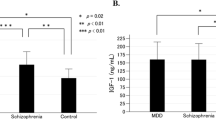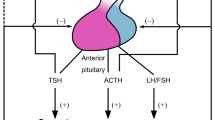Summary
Baseline and TRH-induced changes of thyroid stimulating hormone (TSH), prolactin (PRL), and growth hormone (GH) were measured in 15 healthy control subjects and 63 psychiatric inpatients with DSM-III diagnoses of major depression (n = 19), schizophrenic disorder (n = 20), alcohol dependence (n = 10), and adjustment disorder (n = 14); baseline and postdexamethasone cortisol (CS) were also determined 3–6 days after the TRH-challenge. All patients and controls were women of similar mean age, weight, height, and they were free from interfering illness or drugs.
Baseline TSH and PRL were lower in depression, TRH-induced TSH and PRL responses were lower in the whole patient group, but most markedly in depression and alcohol dependence. Postdexamethasone CS was significantly higher in depression, schizophrenia and alcohol dependence. Basal GH did not differentiate the subgroups; TRH-induced pathological GH responses were sometimes found in the patient groups. The differences were most marked quantitatively in major depression: a multivariate analysis of variance showed that ΔTSH, postdexamethasone CS and ΔPRL were the most important variables in separating patients from controls. A discriminant function derived from these variables classified all controls and 18 of 19 depressed patients correctly; however, 25 of the 44 other patients were also classified with depression.
It was confirmed that psychiatric patients show significantly more endocrine disturbances than controls, and this was seen not only in major depression but also in at least three other conditions. Further work is needed to identify other neuroendocrine patterns more specific to depressive disorder.
Similar content being viewed by others
References
Abou-Saleh MT, Merry J, Coppen A (1984) Dexamethasone suppression test in alcoholism. Acta Psychiatr Scand 69:112–116
Ågren H, Wide L (1982) Patterns of depression reflected in pituitary-thyroid and pituitary-adrenal endocrine changes. Psychoneuroendocrinology 7:309–327
American Psychiatric Association (1980) Diagnostic and Statistical Manual of Mental Disorders, 3rd edn. Washington, APA
Amsterdam JA, Winokur A, Lucki J, Caroff S, Snyder P, Rickels K (1983) A neuroendocrine test battery in bipolar patients and healthy subjects. Arch Gen Psychiatry 40:515–521
Berger M, Doerr P, Lund R, Bronisch T, von Zerssen D (1982) Neuroendocrine and neurophysiological studies in major depressive disorders: are there biological markers for the endogenous subtype? Biol Psychiatry 17:1217–1242
Bjørum N, Kirkegaard C (1979) Thyrotropin-releasing-hormone test in unipolar and bipolar depression. Lancet II:694
Carroll BJ (1982) The dexamethasone suppression test for melancholia. Br J Psychiatry 140:292–304
Cavagnini F, Maraschini C, Pinto M, Dubini A (1979) Prolactin secretion in obese patients. Lancet II:1020
Collu R (1979) Abnormal pituitary hormone response to thyrotropin-releasing-hormone: an index of CNS dysfunction. In: Tolis G, Labrie F, Martin JB, Naftolin F (eds) Clinical neuroendocrinology. Raven Press, New York
Coppen A, Abou-Saleh M, Milln P, Metcalfe M, Harwood J, Bailey J (1983) Dexamethasone suppression test in depression and other psychiatric illness. Br J Psychiatry 142:498–504
Dewan MJ,Pandurangi AK, Boucher ML, Levy BF, Major LF (1982) Abnormal DST results in chronic schizophrenic patients. Am J Psychiatry 139:1501–1503
Extein I, Pottash AL, Gold MS, Martin DM (1980) Differentiating mania from schizophrenia by the TRH test. Am J Psychiatry 137:981–982
Ferrier N, Johnstone EC, Crow TJ, Rincon-Rodriguez I (1983) Anterior pituitary hormone secretion in chronic schizophrenics. Arch Gen Psychiatry 40:755–761
Fleming JE, Extein I, Sternbach HA, Pottash AL, Gold MS (1983) The thyrotropin-releasing hormone and dexamethasone suppression tests in the familial classification of depression. Psychiatry Res 9:53–58
Gold MS, Pottash AL, Davies RK, Sweeney DR, Martin DM (1979) Distinguishing unipolar and bipolar depressions by thyrotropin release test. Lancet II:411–412
Hällström T, Samuelsson S, Balldin J, Wålinder J, Bengtsson C, Nyström E, Andersch B, Lindstedt G, Lundberg PA (1983) Abnormal dexamethasone suppression test in normal females. Br J Psychiatry 142:489–497
Kline MD, Becher AR (1983) Weight loss and the dexamethasone suppression test. Arch Gen Psychiatry 40:1034–1035
Linnoila M, Lamberg BA, Rosberg G, Karonen SL, Welin MG (1979) Thyroid hormones and TSH, prolactin and GH responses to repeated TRH and LRH injections in depressed patients. Acta Psychiatr Scand 59:536–544
Loosen PR, Prange AJ (1982) Serum thyrotropin response to TRH in psychiatric patients: a review. Am J Psychiatry 139:405–416
Loosen PT, Kistler K, Prange AJ (1983) Use of TSH response to TRH as an independent variable. Am J Psychiatry 40:700–706
Maeda K, Kato Y, Ohgo S, Chihara K, Yoshimoto Y, Yamaguchi N, Kuromaru S (1975) GH and prolactin release after injection of TRH in patients with depression. J Clin Endocrinol Metab 40:501–505
Maeda K, Kato Y, Yamaguchi N, Chihara K, Ohgo S, Iwasaki Y, Yoshimoto Y, Moridera K, Imura H (1976) GH release following TRH injections in patients with anorexia nervosa. Acta Endocrinol 81:1–11
Mendlewicz J, Linkowski P, Brauman H (1979) TSH responses to TRH in women with unipolar and bipolar depression. Lancet II:1079–1080
Raskind M, Peskind E, Rivard MF, Veith R, Barnes R (1982) DST and cortisol circadian rhythm in primary degenerative dementia. Am J Psychiatry 139:1468–1471
Spitzer RL, Endicott J, Robins E (1978) Research Diagnostic Criteria for a selected group of functional disorders. NIMH, New York
Stokes PE, Stoll PM, Koslow SH, Maas JW, Davis JM, Swann AC (1984) Pretreatment DST and hypothalamic-pituitary-adrenal function in depressed patients and comparison groups. Arch Gen Psychiatry 41:257–267
Targum SD, Byrnes SM, Sullivan AC (1982) The TRH stimulation test in subtypes of unipolar depression. J Affect Disord 4:29–34
Targum SD, Sullivan AC, Byrnes SM (1982a) Neuroendocrine interrelationships in major depressive disorder. Am J Psychiatry 193:282–286
Targum SD, Sullivan AC, Byrnes SM (1982b) Compensatory pituitary-thyroid mechanisms in major affective disorder. Psychiatry Res 35:85–97
Winokur A, Amsterdam J, Caroff S, Snyder PJ, Brunswick D (1982) Variability of hormonal responses to a series of neuroendocrine challenges in depressed patients. Am J Psychiatry 139:39–44
Winokur A, Amsterdam JA, Oler J, Mendels J, Snyder PJ, Caroff SN, Brunswick DJ (1983) Multiple hormonal responses to protirelin (TRH) in depressed patients. Arch Gen Psychiatry 40:525–531
Author information
Authors and Affiliations
Rights and permissions
About this article
Cite this article
Banki, C.M., Vojnik, M., Arato, M. et al. Dexamethasone suppression and multiple hormonal responses (TSH, prolactin and growth hormone) to TRH in some psychiatric disorders. Eur Arch Psychiatr Neurol Sci 235, 32–37 (1985). https://doi.org/10.1007/BF00380966
Received:
Issue Date:
DOI: https://doi.org/10.1007/BF00380966




